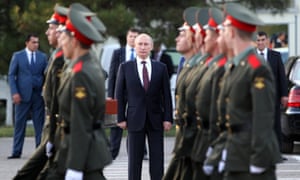Riding To The Rescue
Just as nature abhors a vacuum, so too does Vladimir Putin, the world's newest Machiavelli, appreciates an opportunity. The NATO and United States-and-allies pullout from Afghanistan has created just such an opportunity. It is a vacuum by any other name. One that reflects in part, what has been occurring in Syria and in Iraq, where the American presence is far less obvious than it once was, as a dominating issue of U.S. prestige and power.That was then; now the Obama administration has made good on its promise to present a new American face to the Middle East.
That face is clearly not as finely etched as it once was; it is a fading face, one that has almost vanished. The vanishing act has created an obvious conundrum with the realization that America out: Russia in. And so, President Obama has engaged in a little back-tracking, deciding here and there that perhaps an American absence would not, after all, make the Middle East heart grow fonder, at all. So a mini-reversal was in order. Back into Iraq.
 |
| Vladimir Putin visits Russia’s military base in Tajikistan, to which Moscow has begun sending reinforcements. Photograph: EPA |
In May the governments of Pakistan and Afghanistan signed a significant agreement, one that might reflect to the untutored observer that these two countries are allies, when in fact Pakistan has never set aside its ambition to control Afghanistan, for a number of reasons, one of which is to ensure that India never gets more than a foothold in influence and cooperation with Afghanistan.
Pakistan is largely responsible for the durability and lethality of the Taliban.
Pakistan's Inter-Services Intelligence agency and the Afghan National Directorate of Security were to forge a partnership, following on Pakistan's Prime Minister Nawaz Sharif's visit to Kabul to pledge his country's support for Afghanistan, struggling to combat the very Islamist militancy that Pakistan had perpetrated upon its neighbour.
It's not as though Afghanistan hasn't been aware of Pakistan's sinister machinations. Under former President Hamid Karzai, Pakistan was repeatedly accused, on the basis of recognized reality, of logistical support of the Taliban.
Afghanistan's successor-President Ashraf Ghani evidently wants to forge a new relationship with Pakistan, one of trust and mutual agreeability. "The agreement indicates a change in Afghanistan's policies. It is now directly approaching Pakistan to maintain regional peace and stability", said Abdul Ghafoor Liwal, a constitutional law expert, director of the Regional Studies Center in Kabul who interprets the gambit as a hoped-for conclusion of the cycle of violence in Afghanistan.
He noted the huge "political risk Ghani is embarked upon", given his predecessor's attempt to unsuccessfully build bridges of cooperation.
Into this familiar quagmire, an almost mirror-image of Syria, has stepped Moscow. The gap left by NATO's withdrawal and subsequent Taliban and Islamic State advances in Afghanistan provided the prod in recall of the 15,000 Russian soldiers and countless Afghan civilian lives lost in the 1979-89 Russian invasion of Afghanistan. Again, quite like Syria, Moscow's leadership claims fears over ISIS as a growing threat with its international training camps established in Afghanistan and the prospect of jihadis entering central Asia and Russia's Muslim Caucasus.
Mr. Putin characterizes the situation in Afghanistan as "close to critical", of course not being critical one whit of the NATO-U.S. failure in pacifying the country by drubbing the Taliban out of existence. Moscow's special envoy on Afghanistan claims 3,500 ISIS jihadis are established in Afghanistan, that number rapidly increasing. "There are several camps that train people from Central Asia and some regions of Russia", warned Zamir Kabulov at a Commonwealth of Independent States (CIS) summit in Kazakhstan; their instructors Arabs, Pakistanis, along with American and British citizens.
"The Russian side is committed to support Afghanistan in terms of helping its air and military forces" said Dostum’s spokesman. "We’re lacking air support, weapons, ammunition. We need a lot of backing and support to fight against terrorism." So, according to Kadyrov: "Dostum noted that Isis is trying to make Afghanistan into a bridgehead … In order to prevent this threat, Kabul needs Russia’s support, as in Syria."
Labels: Afghanistan, NATO, Pakistan, Russia, Taliban, United States
0 Comments:
Post a Comment
<< Home